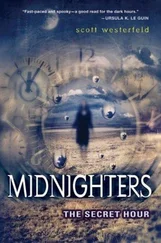Kids in the old days must have loved nightmares or something.
“You’re the one who sings,” Dr. Prolix said, her gaze dismissing the rest of us and locking onto Minerva. Her voice was dry and raspy, like two sheets of paper rubbing together. Her unwrinkled face didn’t look that old, except for the thinness of her skin and the stiffness of her smile. She looked like one of her own dolls, decorated with glowing human eyes.
“Yeah, that’s me,” Minerva said in a small voice.
“And where did you learn these songs, young woman?”
“When I first got sick, I felt something down in my basement calling me, making me sort of…” She let out a giggle.
“Sexually aroused?” Dr. Prolix asked.
“Yeah, I guess. When I went there in my fevers, I could hear whispering from the cracks.” Minerva shrugged. “So I started writing down what they said.”
I swallowed. I’d never really thought about where her lyrics had come from, but then, Minerva had never mentioned that they’d bubbled up from underground. That seemed like the kind of thing you might mention .
“Perhaps I might hear a few words?” Dr. Prolix said.
“Um, is that a good idea?” Pearl asked softly.
“Don’t sing, dear,” the old woman said. “Just speak them.”
Minerva paused a moment, then cleared her throat.
A few syllables came from her mouth, at first halting and tangled, like someone trying to imitate the sound of a sink gurgling. But then she started speaking in rhythm, and the weird sounds smoothed into words.
Then Minerva fell into the verses and choruses Pearl had built around the nonsense syllables, pitching her voice in a singsong way. I recognized a few phrases from Piece Two, and my fingers moved half-consciously, playing the bass line in the air, so I didn’t notice when she started singing.
Maybe the floor trembled a little.
“Stop that!” Dr. Prolix snapped.
Minerva came to a halt, shaking her head as though she were snapping out of a daydream. Then she shrugged. “Sorry.”
“I always wondered how that worked,” Dr. Prolix said softly from behind her desk.
“How what worked?” Cal said. “What is that?”
“The last time the enemy came was seven hundred years ago, before I was born. But the Night Mayor was born toward the end of those times.”
I blinked. Okay, this woman was talking about centuries—about being alive for centuries . I felt my brain trying to switch off, like when a crazy person is ranting on the subway and you totally don’t want to hear it, but you can’t stop listening.
Dr. Prolix spread her hand on her desk. “Have you ever considered, Cal, how the previous invasions were dealt with? Without seismographs? Without walkie-talkies and cell phones?”
“Um… I thought maybe they didn’t deal so well?” he said. “Of course, they didn’t have Homeland Security in the way, making it hard to move medicine into regions suffering outbreaks, and there weren’t any subway tunnels for the enemy to slide around in. But it must have been hard. What did they lose last time? Two hundred million people?”
“And yet humanity survived.” She folded her hands. “Legend has it that they didn’t have to wait for the worms to come up. Certain peeps, called ‘singers,’ were able to bring them forth. So the Watch set traps and ambushes and killed the enemy at will.”
Cal breathed out a little sigh. “And we believe this?”
Dr. Prolix nodded. “The Night Mayor saw it happen when he was a child. He saw a woman call up a worm.” Her glowing eyes swept across the rest of us. “Along with fifteen drummers and bell-ringers and a man with a conch horn, with a great throng watching, waiting for the kill.”
Conch horn? I thought. Oh, great. I was going to have to switch instruments again .
“Dude,” Lace said, punching Cal in the shoulder. “How come you never told me about this?”
“First I’ve heard of it,” he muttered.
“Some of the old ways were lost.” Dr. Prolix looked down at her hands. “Many of us burned in the Inquisition.”
“Those guys again,” Cal said.
“But the knowledge was not completely lost, it seems.” Dr. Prolix looked at Minerva. “Where do you live, child?”
“Um, Boerum Hill.”
The doctor nodded. “Some of the old families are buried there.”
“Buried?” Minerva said. “Eww.”
My jaw dropped. “You mean, like, we were doing songs that dead people wrote?”
“Excellent point, Zahler,” Cal said. “Come on, Dr. Prolix, this is just wishful thinking. Even if the Watch used to know how to call worms back in the old days, the information’s lost, burned at the stake. Why would it be sitting around waiting for some kid in a basement, especially here in the New World?”
“I don’t know, Cal.”
He shook his head. “We only saw it happen once, and that was hardly a controlled experiment. More like a coincidence. The enemy loves to feed in big crowd situations, like that riot the other day in Prague.”
Dr. Prolix was silent for a moment, and I dared to relax a little. Maybe they were going to forget this whole Minerva thing and take us back to New Jersey. We’d only been here half an hour; the sun would still be bright outside…
“No,” Alana Ray spoke up. “It was not a coincidence.”
Everyone looked at her, and she shivered. Then she touched her own chest three times and pointed a quivering finger at Dr. Prolix.
“I can see things. I have a neurological condition that may cause compulsive behavior, loss of motor control, or hallucinations. But sometimes they are not hallucinations, I think, but the realness that comes from the patterns of things. I can see how music works, and I often saw something happening as we rehearsed, and when Morgan’s Army played…”
“Morgan’s Army?” Lace said. “Isn’t their guitarist infected?”
“By Morgan herself,” Cal said softly.
“But not their singer,” Alana Ray said, her head jerking toward Minerva. “That’s why we made it real, not them.”
Great , I thought. Ten thousand bands in New York City and I had to be in the monster-calling one.
“Alana Ray’s right.” Pearl stepped right up to the red line. “It’s not just Minerva. Everyone in the New Sound has stumbled on bits and pieces of this.” She turned to Cal. “You’re always saying how nature stores things: in our genes, in the diseases we carry, even in our pets. Everything we need to fight the worms is all around us. So maybe music’s a part of that.”
“Music?” Cal said. “Music isn’t biology.”
I nodded. “Yeah, Pearl. We’re not talking about some force of nature. We’re talking about us .”
She shook her head. “What I’m talking about is whenever a thousand people gather in one spot and move together, all focused on the same beat, mouthing the same words, riding the same twists and turns. I’m talking about the Taj Mahal of human rituals: a huge crowd hanging on the edge together, waiting for a single note to be played. It’s lateral and magic and irresistible, even if you happen to be a giant worm.”
“In other words, music is biology.” Minerva smiled. “Just ask Astor Michaels about that, Cal.”
He rolled his eyes. “And dead people wrote your lyrics?”
“I don’t know where Min’s words came from, okay?” Pearl said. “Maybe they’re passed on through the disease somehow, and Min just imagined them coming out of the walls. Or maybe they’re really nonsense, and it’s the melodies that count. But they work, don’t they?”
Alana Ray nodded. “They make the air shiver.”
“They’re something I thought we’d lost,” Dr. Prolix said softly. “We can’t fight what we can’t find, after all. But if we could call the worms to a place of our choosing, this war might be much shorter.”
Читать дальше












